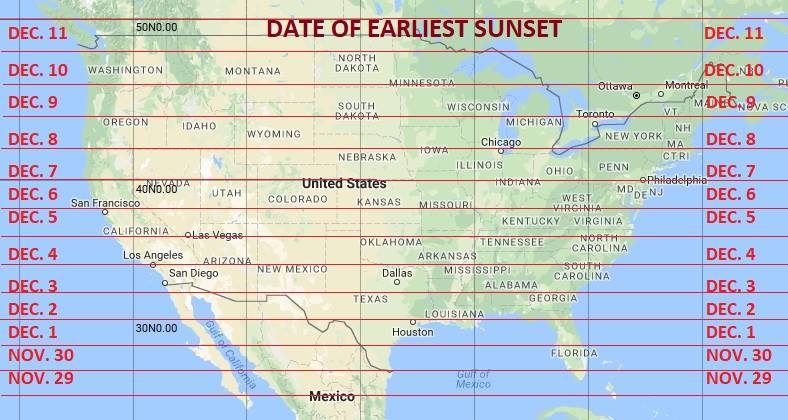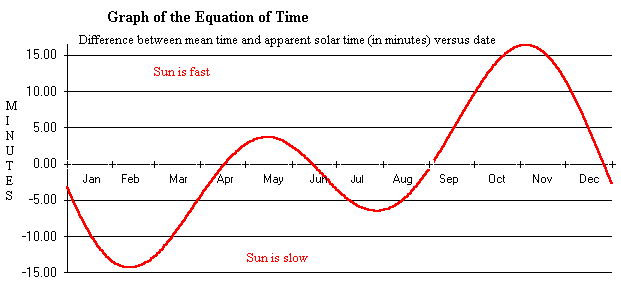THE SOUTHWORTH PLANETARIUM
207-780-4249 www.usm.maine.edu/planet
70 Falmouth Street Portland, Maine 04103
43.6667° N 70.2667° W
Altitude: 10 feet below sea level
Founded January 1970
Julian Date: 2458827.16
Julian Date: 2458827.16
2019-2020: LXVII
"We sent a quiz about time traveling on Friday, but we don't know where it went."
THE DAILY ASTRONOMER
Monday, December 9, 2019
Earliest Sunset Today!
Have you noticed the Sun? Correct. Our gloriously beautiful, blindingly bright, theoretically warm parent star beats a hasty retreat below the western horizon soon after mid afternoon, currently. Those who slave away in a subterranean planetarium all day playing "Asteroids" on the full dome projector see little more than fading twilight when venturing up into the upper world. Such is the nature of things on a tilted planet this time of year for Northern Hemisphere dwellers. Those who find this situation a bit mood-dampening should take heart, however, for although we're still more than two weeks shy of the winter solstice, the earliest sunset will occur THIS coming weekend! After that, the sunset time will gradually increase until July!
As we can see from the graphic below, the date of earliest sunset is latitude dependent. Those spoiled sods in the south have already experienced their earliest sunset and so the sunset times have already started to increase. We here along America's left eyebrow will experience the earliest sunset today. The Sun will set at 4:04 p.m. Now, the sun set time will still be 4:04 p.m. until December 15th, on which date the Sun will set at 4:05 p.m! Granted, the onset of night will occur in the afternoon for quite awhile. However, the sun will not set any earlier than it sets today.

Hey! When is YOUR earliest sunset? The answer depends on your latitude. Those residents in the south have already experienced their earliest sunset. Those of us dwelling in the Great White North (or, a hair's breadth south of it) will experience the earliestsunset. Note for the curious: the duration of daylight at the Equator is always 12 hours every day of the year.
Why isn't the earliest sunset date on the actual solstice? Well, because Earth is not a uniformly dense, perfectly spherical planet following a precisely circular orbit. Instead, Earth is an oblate spheroid of unequal mass distribution so that its shape is not perfectly spherical. Sunlight strikes it unevenly. Moreover, Earth moves along an elliptical orbit so that its distance from the Sun veers from perihelion (point of least distance) in early January to aphelion (point of greatest distance) in early July. All the while, Earth rotates uniformly on its axis. Because of this complex motion, the Sun doesn't always cross the due south point -the meridian-precisely at noon every day. In fact, the Sun only passes due south at noon on four days a year, when the "Equation of Time" equals zero. (Please refer to the second graphic.)

Now, if Earth were a perfect ball traveling around a perfect circle, the Sun would reach the meridian at noon every day. The earliest sunset would occur on the winter solstice. Yet, our exasperatingly complicated Universe doesn't allow for such convenience. The passage of the Sun across the meridian occurs before noon this time of year. But, as one will notice from the above graphic, the equation of time equals zero by late December. Although the daylight duration continues to decrease slightly, the sunset time starts to increase by the second week of December simply because the meridian passage is happening slightly later each day.
Realize that at the same time, the sunrises will continue to happen later and later until January! For us, the earliest sunset date occurs before the winter solstice which happens before the latest sunrise. Conversely, the earliest sunrise occurs before the summer solstice which occurs before the latest sunset.
Those who are despairing at the sight of the afternoon darkness can derive solace from the realization that the sunsets will start happening later very soon.
To subscribe or unsubscribe from the "Daily Astronomer"
http://lists.maine.edu/cgi/wa?A0=DAILY-ASTRONOMER